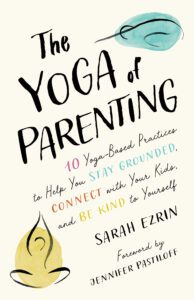
SARAH EZRIN is the author of The Yoga of Parenting. She is world-renowned yoga educator and content creator based in the San Francisco Bay Area, where she lives with her husband, two sons, and their dog. Her willingness to be unabashedly honest and vulnerable along with her innate wisdom make her writing, classes, and social media great sources of healing and inner peace for many people.
Sarah is a frequent contributor to Yoga Journal and LA Yoga Magazine as well as for the award-winning media organization, Yoga International. She also writes for parenting sites Healthline-Parenthood, Scary Mommy, and Motherly. She has been interviewed for her expertise by the Wall Street Journal, Forbes Magazine, and Bustle.com and has appeared on television on NBC News. Sarah is a highly accredited yoga teacher. A world traveler since birth, she leads teacher trainings, workshops, and retreats locally in her home state of California and across the globe. For more information, visit Sarah on www.sarahezrinyoga.com, Instagram @sarahezrinyoga, and TikTok @sarahezrin.
Below is an excerpt from The Yoga of Parenting by Sarah Ezrin © 2023. Reprinted in arrangement with Shambhala Publications, Inc. Boulder, CO. www.shambhala.com
WHEN AN OVERACHIEVER BECOMES A PARENT
My yeses and nos have always been a bit backward when it comes to differentiating my personal life from my work life. Just before I met my husband, I was so burned out and overworked that my health was affected. I would binge and purge every weekend and then restrict and overexercise all week (and this is when I was “healthy”). I would go months without a day off, unable to say no. Sometimes I would teach a yoga class just minutes after major life events, like deaths in the family or breakups, barreling through the intense emotions with work instead of taking the time to process.

When an injury prevented me from not only teaching yoga asana, the physical practice, but also practicing it (the two things I had rigidly come to define my entire life by), things began to soften for me. First, my injury was so bad that I had to pull out of some work commitments, something I had never done in my entire teaching career at that point. For a people-pleaser, my work commitments are like blood oaths. Surely my saying no would ruin my career and I would lose any new opportunities and never travel for teaching again.
Spoiler alert: none of that came true.
Instead, fast-forward to seven years later: I am happily married with two beautiful boys, and I can honestly say that in learning how to balance what I say yes to and no to, my career has been able to thrive right alongside my family.
Would I be deeper into my leg-behind-the-head poses had I kept prioritizing my asana over my relationships and developing a family? Possibly, but I would not trade newborn and toddler cuddles for shoving my leg behind my head for anything.
NO IS NOT A BAD WORD
It’s not easy, learning how to say no to those you love the most. Some brain researchers say that we are hardwired to associate the word with negativity and that opposite parts of the brain fire when hearing no versus yes. I know many parents who try to never say the word to their children. I try to set positive limits in other ways, for example, by acknowledging what my kids can do or explaining why something may not work right now, versus just saying no outright. They say a toddler hears no four hundred times a day, so I get the hesitation, but may I suggest something perhaps a bit controversial?
What if saying no is not necessarily a bad thing? What if saying no is a necessity? What if we could retrain our brain to understand that saying no is really saying yes to something else? Most often yourself? As Anne Lamott sums up in her hilarious and raw book Operating Instructions: A Journal of My Son’s First Year, “‘No’ is a complete sentence.” The author and activist Glennon Doyle also explained this well in a recent episode of her We Can Do Hard Things podcast, saying that a big part of mitigating one’s tendency to people-please is “having the intellectual honesty to know that every ‘yes’ is a ‘no’ and every ‘no’ is a ‘yes.’”
This is absolutely true for me. When I’m saying yes to please everyone else, I am ultimately saying no to my own needs. This then leads me to feel overwhelmed and overcommitted. My work suffers and my relationships suffer when my self-care suffers.

Our children also learn boundaries through our modeling— both how to set them and how to disrespect them. I am already seeing clear evidence that my eldest, Jonah, even as a toddler, is requesting to set his own boundaries, and I work hard to respect those. For example, when we have people visit or we go stay with family, he (much like me) loses steam after a few days in and needs a break from all the social engagements. When he couldn’t speak yet, he would tell me by needing constant contact with me, acting much more relaxed when lying together quietly in a dark room versus when he was the center of attention (that part of him is not like me). Now that his verbal skills are better developed, he literally asks to stay in bed some days or to stay home versus going out somewhere or being around other people.
Can we respect our children’s boundaries when they request them? Can we take no as a complete answer when they don’t want to do something we have asked them to do? Like physical affection toward a family member, eating certain foods, or not wanting to go somewhere we had planned for them? Where is the line between setting your own limits and listening to your child’s needs?
This is where the connection piece of parenting comes in. If we are in tune with our child’s needs, then we can gauge on that particular day and in that particular moment if we are able to acquiesce; or if it happens to be a day when our child is just being unnecessarily difficult to assess, what/if any limit needs to be set and enforced. You can use all of the skills we practice on our yoga mats, such as becoming sensitive to life-force energy (both yours and your child’s). Or grounding in your body and/or breath. Observe the fluctuations of your nervous system. Remember that any one of these simple actions (if not all) can help us become more connected with our children and therefore be clearer on what our children truly need, so we can say yes to their no.


